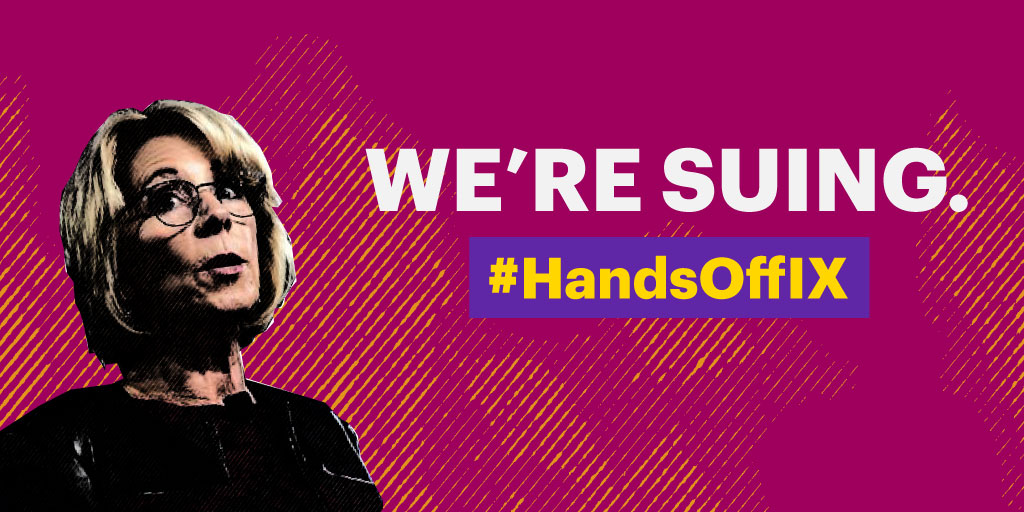All gifts, up to $10,000, TRIPLE-matched until June 30!
Biden’s Proposed Title IX Rules Would Restore Protections Lost Under Trump—But They Should Go Even Further.

Yesterday, we submitted a flurry of comments to the Department of Education on its proposed Title IX rules regarding sex discrimination in schools!
The proposed rules are a step in the right direction, as they would undo many of the harmful changes regarding sexual harassment made by the Trump administration and would clarify protections for LGBTQI+ students and pregnant and parenting students.
But the Department should go further in protecting students’ civil rights.
Here are some things we asked the Department to keep in their final Title IX rules:
- Sex-based harassment. Consistent with many long-standing previous policies, require schools to address all reports of “severe or pervasive” sex-based harassment, including off-campus or abroad incidents, as long as the reporting student was participating or trying to participate in a school program when they were harassed.
- Supportive measures. Require schools to offer supportive measures (which help students learn and feel safe) to all students who report sex discrimination, even if they don’t want an investigation or if their complaint is dismissed.
- Retaliation. Prohibit schools from disciplining students for breaking a school rule during their own harassment (e.g., alcohol or drug use) or for making a “false” statement based solely on the school’s belief that they were not harassed.
- LGBTQI+ status. Consistent with the Supreme Court’s decision in Bostock, and other federal court decisions, define sex discrimination to include discrimination based on sex stereotypes, sex characteristics (including intersex traits), sexual orientation, and gender identity.
- Pregnancy or related conditions. Require schools to make reasonable accommodations for a student’s pregnancy or related condition (e.g., childbirth, termination of pregnancy, lactation). Require schools to allow these students to take a leave of absence for as long as medically necessary and to take lactation breaks in a clean, private, non-bathroom space.
- State/local protections. Allow schools to follow state or local laws that provide greater protections against sex discrimination.
Here are some things we asked the Department to change in their final Title IX rules:
- Confidential employees. Require (rather than just allow) schools to designate some employees as “confidential employees,” whom students can turn to for confidential help when they experience sex discrimination.
- Supportive measures. If a school knows that current supportive measures are not helping a student, require the school to offer other supportive measures.
- Retaliation. Prohibit schools from disciplining a student for doing something that the school knows or should know “results from” the sex discrimination they faced (e.g., missing school, expressing trauma).
- Questioning parties and witnesses. Help colleges and universities better understand how they can investigate sex-based harassment without relying on live hearings and cross-examination.
- Standard of proof. Require schools to use the preponderance of the evidence standard (“more likely than not”) in all Title IX investigations (instead of allowing some schools to use a standard that’s unfair to complainants).
- Anti-transgender harassment. Clarify that harassment based on a student’s gender identity includes intentional misuse of names and pronouns (versus making a mistake and correcting it).
- Pregnancy or related conditions. Require schools to allow shorter absences that are medically necessary (e.g., for prenatal care, lactation breaks, abortion care). Prohibit schools from disciplining or referring students to police for having an abortion or miscarriage.
- Parental, family, or marital status. Define sex discrimination to include any discrimination based on parental, family, or marital status—not just when such discrimination treats people differently based on their gender (for example, not just when schools treat mothers worse than fathers).
- Privacy. Help schools ensure their records are not used to out an LGBTQI+ person or prosecute under a state law a pregnant person who had an abortion or miscarriage.
We also urged the Department to issue rules on these other Title IX topics as quickly as possible:
- Athletics. Issue proposed Title IX changes by the end of 2022 to ensure trans, non-binary, and intersex students can fully and equally participate in school sports.
- Religious exemptions. Prohibit nonreligious schools from using religion as an excuse to violate Title IX. Require religious schools to provide advanced notice to students, employees, and the Department of any claimed religious exemptions.
- Dress codes. Prohibit sex-based dress and appearance codes, which disproportionately target and harm girls and women (especially those of color) and LGBTQI+ students.
- Sex-segregated education. Prohibit sex-segregated classes and schools that rely on debunked stereotypes about “innate” differences between girls and boys.
To learn more about our Title IX recommendations to the Department of Education, check out these comments/letters we led or coordinated:
Recommendations on the full Title IX rules
- NWLC’s Comment
- Advocates’ Sign-On Comment (led by NWLC) on behalf of 189 survivor advocate, gender justice, and other civil rights organizations
- Individuals’ Sign-On Comment on behalf of 8,000+ members of the public
- State Legislators’ Sign-On Comment on behalf of 62 state legislators
Recommendations on LGBTQI+ students’ rights
- Advocates’ Sign-On Comment (led by GLSEN; co-led by NWLC) on behalf of 250+ education, civil rights, and youth-serving organizations
- Advocates’ Sign-On Letter to President Biden (co-led by NWLC) on transgender inclusion in athletics on behalf of 50 women’s rights and gender justice organizations
Recommendations on pregnant and parenting students’ rights
- Advocates’ Sign-On Comment (co-led by NWLC) on behalf of 27 organizations
- Students’ Sign-On Comment on behalf of 75 current and former pregnant and parenting students




